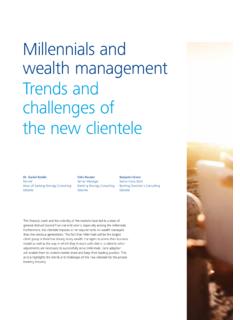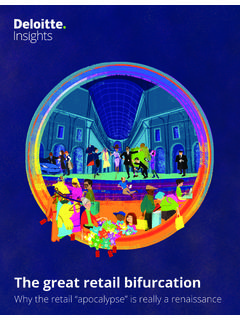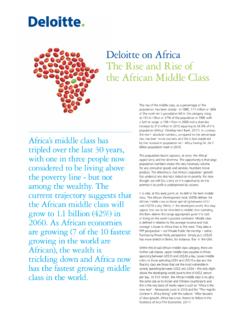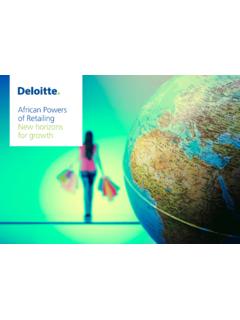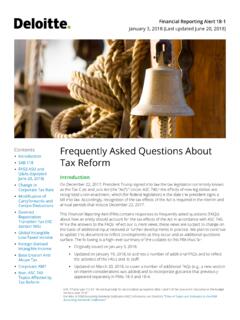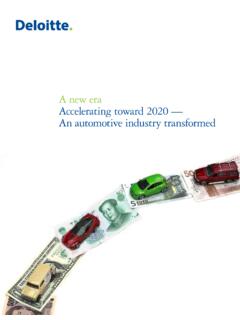Transcription of Fintech | On the brink of further disruption
1 December 2020 | Deloitte Financial Advisory Netherlands Valuation & Modelling | Corporate FinanceFintech | On the brink of further disruptionFintechs Fintechs have changed how financial services are structured, delivered and consumed, but many have not successfully established themselves as dominant players yet. The next challenges in their growth path are investigated in this report. Strategy &M&ADeal activity within the Fintech space is constantly evolving. By tracing investment activity from a global level to the European ecosystem, this reportassesses the geographies and segments that received the highest investments and potentially offer the highest growth potential. BoardIt is important to establish a clear strategy to deal with Fintechs for companies active within the financial sector. This report provides key factors and considerations to consider when engaging in strategic partnerships or acquisitions.
2 Financial institutionsCooperation between financial institutions and Fintechs encounters several hurdles. This report provides ideas for enabling better, more efficient cooperation between incumbent Financial institutions and Fintech of activity global services22 Why does this report matterStructure of the reportThis is a five-part report. After providing an introduction on the total Fintech market, the second part provides perspective on the changes that Fintechshave brought to the financial services industry, including identified opportunities, interaction with incumbents and what is the promise ahead. The thirdpart gives an overview of Fintech global investment activity, including breakdowns per deal type and regions, and an analysis of potential COVID-19 effects on the industry. The fourthpart zooms in on the European Fintech ecosystem and continues with an overview of the evolution of the Fintech landscape, most important deals and deal activity of incumbents.
3 We conclude with an overview of specific M&A and valuation related challenges in executing Fintech deals. Fintech | On the brink of further disruption2 2020 Deloitte The NetherlandsIntroduction0101 IntroductionFintech | On the brink of further disruption3 2020 Deloitte The NetherlandsFintech continues to transform the financial services industryFINTECH | INTRODUCTIONThe term Fintech (Financial Technology) refers to computer programs and other modern technologies used by businesses that provide automated and improved financial services. Since the last global financial crisis, investments in Fintech have been growing. The expansion of the sector was largely a technological response to the shortcomings of the traditional financial services industry, which came under extreme pressure during and after the crisis. Currently, the COVID-19 pandemic has initiated another recession.
4 We have seen that since the COVID-19 outbreak the financial sector, together with the energy and real estate sectors, has experienced the largest market capitalization loss, primarily due to concerns about increased credit losses. On the other hand, accommodative measures by governments around the world (labor costs compensation, income support, financing facilities etc.) are likely to help borrowers meeting loan obligations amid an environment of rising defaults. From crisis to crisisDespite the COVID-19 pandemic, we appear to have entered a new phase in the evolution of the financial technology sector. The thinking of many financial institutions has evolved, they're now seeking to team more with emerging technology companies to gain access to new markets and products, greater efficiencies, or just the "secret sauce" that makes innovation go. At the same time, many Fintechs themselves have sought to join with large financial institutions to expand into new markets, extend their client network, gain industry and regulatory knowledge, and even simply cash rise of Fintech , changing consumer behavior, and advanced technologies are disrupting the insurance industry.
5 Insurtechsand technology startups continue to redefine customer experience through innovations such as risk-free underwriting, on-the-spot purchasing, activation, and claims of FintechFintech | On the brink of further disruption4 2020 Deloitte The NetherlandsCAPITAL MARKETSS ales & trading, analysis, and infrastructure tools for financial institutionsBLOCKCHAINC ompanies leveraging blockchain technologies for financial services, crypto-exchanges and crypto-currenciesPAYMENTS & BILLINGP ayments processing, card developer & subscription billing software toolsINSURTECHC ompanies selling insurance digitally providing data analytics and software for (re)insurersWEALTH MANAGEMENTI nvestment and wealth management platforms and analytics toolsREGTECHA udit, risk, and regulatory compliance softwarePERSONAL FINANCET ools to manage bills and track personal and/or credit accountsLENDINGM arketplace lending, microlending & alternative underwriting platformsMONEY TRANSFER & REMITTANCESI nternational money transfer and tracking softwareMORTGAGE &REAL ESTATEM ortgage lending, digitization, and financing platformsOverview of Fintech servicesFINTECH | INTRODUCTIONF intech | On the brink of further disruption5 2020 Deloitte The NetherlandsSource.
6 Mordor Intelligence, Deloitte analysis The APAC and Americas command the highest market share of the global Fintech market, with APAC being projected to be the fastest growing regionFINTECH | INTRODUCTION3238455464748596192021232426 2829293542495558616318820202017202220182 0192021202320248092108126143159174 Global Fintech revenues in 2018 were about 92 billion in 2018 and are expected to grow to more than 188 billion in 2024 (pre-COVID-19 forecast). The Fintech markets in the APAC and Americas regions are currently the largest, with both having around 40% of the global market share. The EMEA region is significantly smaller, with around 20% of the total market share. The Fintech market in the APAC region is projected to be the fastest growing. The digital payments market is the largest segment within the Fintech spectrum and accounts for more than 80% of global Fintech revenues.
7 Although COVID-19 causes uncertainty in the Fintech market, it creates opportunities for the Fintech market as well. The adaptability and innovation of Fintechsmakes the sector well positioned to realize their growth path. Global Fintech revenue to grow by ( 19 24)Global Fintech Fintech revenue ( bn). Note: actual figures up until 2018. These numbers are originally denominated in USD, and were converted to EUR by the Sept. 2020 EUR/USD FX rate of *Compounded annual growth rateCAGR* Fintech | On the brink of further disruption6 2020 Deloitte The NetherlandsFintech share prices have relatively outperformed the traditional financial services industry in the past two years, especially since COVID-19 Fintech | INTRODUCTION5060708090100110120130140150 160 Sep 2018 Jan 2019 Nov 2018 Mar 2019 May 2019 Jul 2019 Sep 2019 Sep 2020 Nov 2019 Jan 2020 Mar 2020 May 2020 Jul 2020 Nov 2020 STOXX Global Fintech IndexMCSI WRLD Financials Index In the graph on the right, the relative share price development of Fintechsand the traditional financial services industry is shown.
8 The STOXX Global Fintech Index includes Fintech companies like Adyen, Visa and PayPal, whereas the MSCI WRLD Financials Index mainly consists of traditional financial institutions. Since September 2018, the STOXX Global Fintech Index has risen by c. 50%, while the MSCI WRLD Financial Index fell by c. 4%. Fintech share prices recovered within four months after COVID-19 impacted capital markets, while traditional financial services industry prices have not yet fully share prices between global Fintechsand traditional financial institutions have diverged since September 2018 Source: Capital IQShare price development in Global Fintech vs. traditional financials (September 2018 index of 100). Data is displayed for theperiod 3 September 2018 -14 December 2020 Index = 153 Index = 96 Fintech | On the brink of further disruption7 2020 Deloitte The NetherlandsIntroduction0102 Fintech disruptionFintech | On the brink of further disruption8 2020 Deloitte The NetherlandsFintechs have changed how financial services are structured, delivered and consumed, but many have not successfully established themselves as dominant players yetFINTECH | Fintech DISRUPTIONW here Fintechshave succeededWhere Fintechs didn t meet expectationsFintechs have materially changed the basis of competition in financial services but have not (yet) materially disrupted the competitive INERTIAC ustomer willingness to switch away from incumbents has beenoverestimated.
9 Customer switching costs are high, and new innovations are often not sufficiently material to warrant the shift to a new provider, especially as incumbents adapt. INFRASTRUCTUREF intechs have struggled to create new infrastructure and establish new financial services ecosystems, such as alternative payment rails or alternative capital markets. They have been much more successful in making improvements within traditional ecosystems and infrastructure. ROADMAPF intechs have seized the initiative defining the direction, shape and pace of innovation across almost every subsector of financial services and have succeeded as both stand-alone businesses and crucial parts of financial value EXPERIENCEF intechs have reshaped customer expectations, setting new and higher bars for user experience. Through innovations like rapid loan adjudication Fintechs have shown that the customer experience bar set by large technology firms, such as Apple and Google, can be met in financial : Deloitte, Beyond Fintech -A pragmatic assessment of disruptive potential in financial servicesFintech | On the brink of further disruption9 2020 Deloitte The NetherlandsAlthough Fintechs have not yet disrupted the competitive landscape, they have laid the foundation for further future disruptionFINTECH | Fintech DISRUPTIONSome financial institutions have turned the threat of Fintechsinto an Fintechshave laid the foundation for further future disruptionSantander is one of the market leading retail banks thatleapt onto the disruptive Fintech wagon.
10 Apart from their 100% online bank, Santander Openbank, based in Madrid, the banking giant has also made significant steps into cryptocurrency, through OnePayFX, ablockchain-based international system available for their customers, used to send and receive transfers between individuals in different rise of Fintechsprovides financial institutions with a supermarket for capabilities, allowing them to use acquisitions and partnerships to rapidly deploy new ability to shop the Fintech landscape for capabilities is not limited to incumbents; new entrants face significantly lower technological barriers to entering financial services, with potential long-term implications for the competitive landscape. Fintechsthat offer unique consumer convenience and marketplace entry have paved the way for further future rapid growth of the Fintech ecosystem allows firms to externalize parts of their innovation function, as they wait and see which new offerings gain traction before deploying their own accelerating paceof the innovation cycle in financial services means that an incumbent financial institution's success is predicated on business model agility and the ability to rapidly deploy partnerships, neither of which are traditional core competencies of these : Deloitte, Beyond Fintech -A pragmatic assessment of disruptive potential in financial servicesCurrently with a market cap of c.
